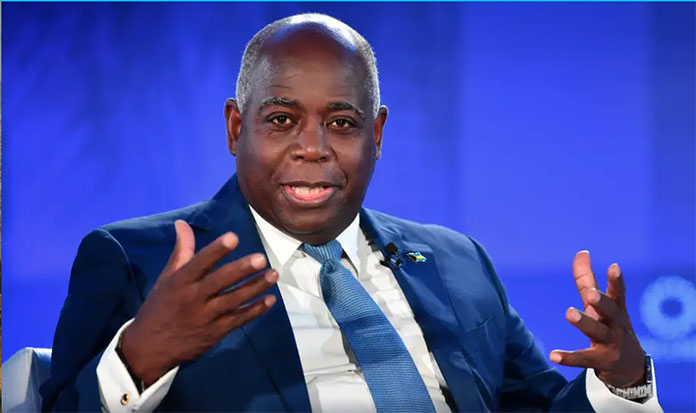
NASSAU, The Bahamas – During his National Address, on January 8, 2025, Prime Minister and Minister of Finance the Hon. Philip Davis noted that the rising cost of food was one of the expenses that hit many families the hardest.
“Even though inflation is now slowing, prices remain higher than many find reasonable or affordable,” Prime Minister Davis said. “And so tonight, I am pleased to announce a 50% reduction in the VAT rate on all food sold in food stores.”
“Beginning April 1st, the rate will be cut in half from 10% to 5%,” he added. “This new 5% rate will apply to all food in the food stores, including fresh fruits and vegetables, baby food, lunch snacks and frozen foods.
“However, it will not apply to prepared foods in the deli.”
Prime Minister Davis pointed out that that rate reduction would also apply to the import of all items previously mentioned. He added that the effective date was April 1st in order to give merchants and foodstores time to make the necessary adjustments.
Prime Minister Davis said: “VAT is not the cause of the high price of food, but for those with the tightest disposable income, reducing VAT by 50% will make a difference. This reduction will not impact our fiscal targets for this year. You will remember how bleak things looked in the summer of 2021 – with all the talk of downgrades, currency devaluation and tax hikes.”
He continued: “In fact, some recommended at the time that our country raise VAT, from 12% to 15%, to bring it in line with our regional neighbours – because we have the lowest VAT in the region. But we thought asking Bahamians just gaining freedom from curfews and lockdowns to pay more VAT on absolutely everything – across the board – would cause real hardship and slow our economic recovery, so instead we lowered VAT, from 12 to 10%.”
Prime Minister Davis pointed out that, instead of going up to 15, as recommended, his Government went down to 10. He added that, since that time, his Government worked really hard to improve the nation’s finances.
“Now that we have put the economy onto a stable, secure footing, we are able to ease the VAT rate to provide financial relief,” he said. “Recently the IMF said that what we have achieved in bringing the economy back as quickly as we did was ‘remarkable’. That is what we achieved together.”
He added: “But the high cost of living means even Bahamians who are back to work are making a lot of hard choices, one after another. Choices like, should I go home after work to take care of a sick family member, or take that second shift? Choices should not have to be made. The basics feel out of reach – not to mention buying a home, or building security for your future.
Prime Minister Davis pointed out that many young people felt stuck, because they cannot afford to take the next step forward.
“The same kind of work that once could have meant a good life, a decent life plus a little more, now does not stretch to cover your monthly costs,” he said. “So, we need to address the underlying structural issues that have caused prices to be high for so long.”
Prime Minister Davis added that his Government had already started by creating the country’s first nationwide energy sector reforms.
He said: “The high cost of energy runs right throughout the economy. Important parts of our outdated electricity grid date back to before Independence. Some of them are so old that no one makes the parts to fix them anymore. But we can’t build a successful economy – and Bahamians can’t build their own success stories – if we continue to be burdened by an old, outdated, system, dependent on heavy and diesel fuels.”
Prime Minister Davis added: “An unreliable system, and above all, an expensive system – you simply can’t build a 21st century economy with 20th century infrastructure. So, we’re reforming, upgrading, modernizing.”
He noted that solar panels were going to go up, and prices were “going to come down”.
“We are partnering with Bahamian companies across our Family Islands, to meet the unique needs of each,” Prime Minister Davis pointed out. “We are going to have New Providence’s first utility-scale solar field. We’re integrating LNG. We’re updating transmission lines and technology, for efficiency – which means cost-savings – for reliability, and increased resilience during storms.”
He noted that it was a huge undertaking, and it was going to make a “huge difference”.
“But the changes will take time – so while that work is happening, we’re offering relief on high monthly electricity bills with an equity rate adjustment – a tariff reduction that has already added up to significant savings for thousands of Bahamian households and businesses,” Prime Minister Davis stated.
“In the coming months and years, imagine how many more Bahamian businesses will grow and thrive, once they are not held back by high electricity costs.”
Prime Minister Davis said that the huge increase in costs of housing had also helped to drive up the cost of living.
He noted that his Government was building affordable housing, and piloting a Rent-to-Own programme.
“But while these are important, they are not reaching enough Bahamians yet,” Prime Minister Davis said. “So even as we work to expand those efforts, we’re exploring ways to incentivize the private sector to build more.”
“Increasing the supply of housing is the best way to see reductions in the cost of housing,” he added. “We have also expanded concessions to first-time homeowners, because it’s so hard to make that big leap.”
Prime Minister Davis that, in health care, his Government established a Catastrophic Health Care Fund.
He said: “When we came to office, we found an enormous backlog of Bahamians waiting for urgent cardiovascular, urological, eye care and orthopaedic surgeries by specialists. To date, hundreds of Bahamians have been able to have these life-changing and in some cases, life-saving surgeries, which they could not have otherwise afforded.
“Forty-one thousand Bahamians now receive their medications free of charge, and we are negotiating with The Pan-American Health Organization – PAHO – and manufacturers to bring down prices for everyone else.”
Prime Minister Davis noted that His Government knows that every cost saving helps.
He pointed out: “We put free Wi-Fi in our parks. We expanded the housing allowance for teachers, and increased school uniform assistance for students. We have signed an historic 33 labour agreements – many of which had been expired for years. We cleared the backlog of promotions in the public service. We implemented a minimum wage increase, even when some argued it was unrealistic.
“The minimum wage isn’t high enough yet, but we’re moving in the right direction.”
Prime Minister Davis noted that some of his Government’s policies to help ease the high cost of living also served additional policy goals.
“Consider our School Breakfast Programme,” he said. “We’ve already served more than 230,000 free hot breakfasts to our school children. This has improved school attendance, and helps our children begin their day ready to learn. It also helps families save at the food store.”
Prime Minister Davis added: “Our agriculture policies also serve multiple goals. When we can grow more of what we eat, we will be less dependent on expensive imports.”
He pointed out that his Government was also seeing the growth of a new entrepreneurial sector for the economy.
“That’s why we’re pioneering innovative agriculture programmes and grants, to support active and aspiring farmers,” he stated. “We are also launching a new Agriculture & Marine Cadet Programme, to provide hands-on training and mentorship.”
He continued: “Because of our remarkable economic recovery, our GDP has grown by 31.4%. And we reduced our deficit from 13.1% to 1.3% — in three years, we knocked more than one billion dollars off our deficit.
“These are things we should all be proud of.”
Prime Minister Davis said that a stronger economy was ultimately “good for us all”.
“From the start, our goal has been to shift more of the tax burden to those who can best afford it,” he said. “That required a number of steps, including new legislation.”
Prime Minister Davis added: “For example, we introduced corporate income tax for multinationals with more than 750 million euros in annual revenue who operate in The Bahamas. This is the first time ever that a tax like this has been imposed here.”
He noted that, instead of adding major new taxes on Bahamians, his Government organized itself to collect much more of the VAT already owed by larger companies.
“We are improving real property tax compliance, but we have exempted more Bahamian property owners than ever before,” he said. “The net result is increased revenue and a net reduction in property tax arrears.”
“We are hopeful that the reduction of VAT on food items will help reduce some of the pain when you pay for your groceries,” Prime Minister Davis added.
(BIS Photos/Anthon Thompson)







